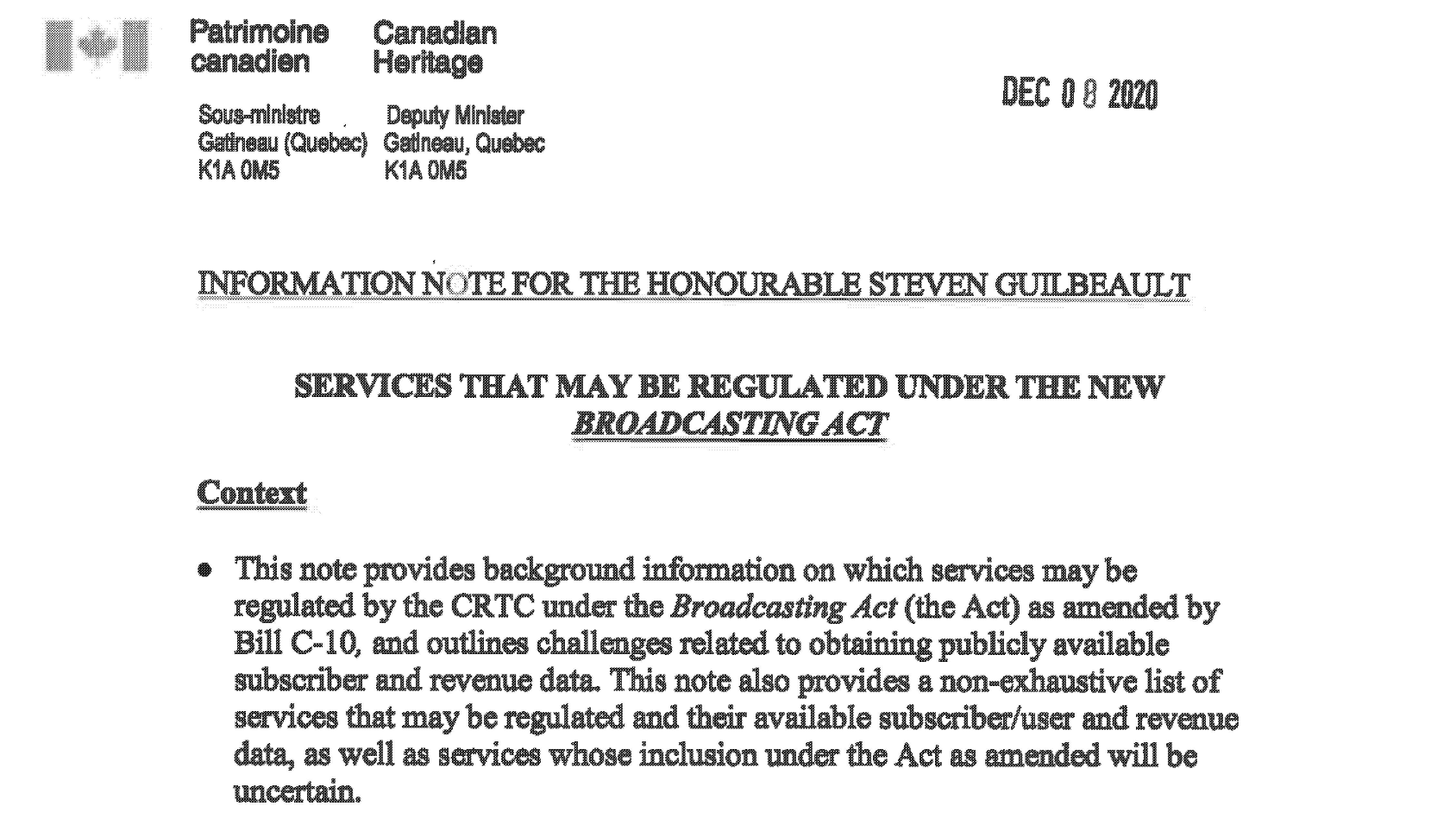The current round of ACTA negotiations wrap up later today in Seoul, Korea. Having spent the first day focused on the now-leaked Internet provisions and the second day on the leaked criminal provisions, negotiators will spend this morning discussing whether they should make the draft treaty public. Many countries continue […]

Canadian Heritage Memorandum, December 8, 2020, ATIP A-2020-00498
Bill C-10
ACTA Negotiations, Day Two: What’s On Tap
As ACTA negotiators head into day two of the Seoul, Korea meetings, the global response to the Internet provisions in the chapter (the issue from day one) has been remarkable. Articles and postings from around the world (Germany, Italy, Sweden, UK, New Zealand, the Netherlands, U.S., Germany, Italy, Hungary, the Netherlands), coverage from some of the most popular websites (Gizmodo, ReadWriteWeb, TorrentFreak, BoingBoing, Slashdot), as well as expert commentary (EFF, Electronic Frontier Australia) has been swift and universally concerned with ACTA.
According to the official agenda, in a few hours talks will continue on the Internet provisions and then move into the criminal provisions chapter. I discussed details of the Internet chapter yesterday, in a post that highlights the creation of a Global DMCA that would severely limit the ability for signatories to use the flexibility found in the WIPO Internet treaties. Moreover, the provisions would pave the way for a globalized three-strikes and you're out system, as ISP safe harbours would be premised on policies to terminate subscribers in appropriate circumstances.
It is worth highlighting the ongoing criminal provisions as well. As previously leaked, the U.S. and Japan supplied the initial text for this chapter. Their proposal included:
The ACTA Internet Chapter: Putting the Pieces Together
The Anti-Counterfeiting Trade Agreement negotiations continue in a few hours as Seoul, Korea plays host to the latest round of talks. The governments have posted the meeting agenda, which unsurprisingly focuses on the issue of Internet enforcement [UPDATE 11/4: Post on discussions for day two of ACTA talks, including the criminal enforcement provisions][UPDATE 11/5: Post on discussions for day three on transparency]. The United States has drafted the chapter under enormous secrecy, with selected groups granted access under strict non-disclosure agreements and other countries (including Canada) given physical, watermarked copies designed to guard against leaks.
Despite the efforts to combat leaks, information on the Internet chapter has begun to emerge (just as they did with the other elements of the treaty). [Update 11/6: Source document now posted] Sources say that the draft text, modeled on the U.S.-South Korea free trade agreement, focuses on following five issues:
1. Baseline obligations inspired by Article 41 of the TRIPs which focuses on the enforcement of intellectual property.
2. A requirement to establish third-party liability for copyright infringement.
3. Restrictions on limitations to 3rd party liability (ie. limited safe harbour rules for ISPs). For example, in order for ISPs to qualify for a safe harbour, they would be required establish policies to deter unauthorized storage and transmission of IP infringing content. Provisions are modeled under the U.S.-Korea Free Trade Agreement, namely Article 18.10.30. They include policies to terminate subscribers in appropriate circumstances. Notice-and-takedown, which is not currently the law in Canada nor a requirement under WIPO, would also be an ACTA requirement.
4. Anti-circumvention legislation that establishes a WIPO+ model by adopting both the WIPO Internet Treaties and the language currently found in U.S. free trade agreements that go beyond the WIPO treaty requirements. For example, the U.S.-South Korea free trade agreement specifies the permitted exceptions to anti-circumvention rules. These follow the DMCA model (reverse engineering, computer testing, privacy, etc.) and do not include a fair use/fair dealing exception. Moreover, the free trade agreement clauses also include a requirement to ban the distribution of circumvention devices. The current draft does not include any obligation to ensure interoperability of DRM.
5. Rights Management provisions, also modeled on U.S. free trade treaty language.
KEI Identifies ACTA Insiders
The next round of Anti-Counterfeiting Trade Agreement talks is just a few weeks away. In advance of that meeting the U.S. government has made the Internet provisions available for review to a select group of insiders. KEI has all the details on who got access and under what conditions.
FCC Commissioned Study Assesses Why Canada Lags On Broadband
The Federal Communications Commission has just posted a comprehensive study it commissioned on broadband policies around the world. Completed by researchers at Harvard University (and led by Professor Yochai Benkler), the study combines a review of international rankings with differing policy approaches. While supporters of the Canadian status quo are sure to find fault with the study (it uses OECD and Speedtest.net data after all), the report is particularly noteworthy given that it attempts to link Canadian policy with its falling rankings.
On the issue of rankings, the study uses several reports to conclude yet again that Canada trails much of the developed world on broadband. The specific rankings are:
- Overall – 22nd
- Access – 16th
- Speed – 20th (using the same Speedtest.net source that Rogers relied upon in its ad campaign that led to a lawsuit by Bell)
- Price – 25th
The report address some of the same criticisms found in a recent Canadian ISP commissioned report such as population density and measuring subscribers vs. households. It concludes that the data is not dramatically different when accounting for these issues. More important, however, is the analysis on how Canada's regulatory environment has led to its middling performance.






